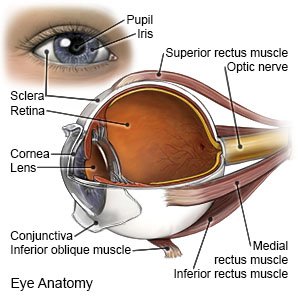Choroidal Nevus
Medically reviewed by Drugs.com. Last updated on Jul 7, 2024.
AMBULATORY CARE:
What you need to know about a choroidal nevus:
A nevus is a freckle that forms under the retina, in the choroid. The choroid is between the sclera and the retina. The retina is the thin layer of tissue that lines the back of your eye. It captures light and sends messages to the brain. A choroidal nevus is not cancer (benign), but it can become cancer over time. This kind of cancer is called choroidal melanoma. Choroidal nevus is a congenital condition. This means you were born with genes that make a nevus develop. They are not found in babies or young children.
 |
Common signs and symptoms:
You may not have any signs or symptoms if the choroidal nevus is benign. If it is cancer, it may cause your retina to detach (come away from your eye). You may have any of the following if you have choroidal melanoma or your retina detaches:
- Severe pain in or around your eye
- Flashing lights
- Vision loss, or a dark or blind spot in the center of your eye
- Seeing floaters, such as spots, cobwebs, strings, or specks
Call your doctor or ophthalmologist if:
- You have a sudden change in your vision or loss of vision.
- You have eye pain.
- You see more floaters or flashes of light than usual.
- You have questions or concerns about your condition or care.
Treatment
is usually not needed unless the choroidal nevus becomes cancer.
Help keep your eyes healthy:
You may not be able to prevent choroidal melanoma, but you can help keep your eyes healthy:
- Wear sunglasses with ultraviolet (UV) light protection. UV light from the sun can damage your eyes.
- Eat foods that contain eye-healthy nutrients. Eye-healthy nutrients include vitamin A, vitamin C, vitamin E, omega-3 fatty acids, lutein, and zeaxanthin. Examples of foods that contain these nutrients include spinach, peanuts, salmon, collard greens, avocados, squash, eggs, and blueberries. Ask your healthcare provider for a full list of foods that contain eye-healthy nutrients. You may also need to take a vitamin or supplement to help you get enough of these nutrients.

- Do not smoke. Nicotine and other chemicals in cigarettes and cigars can cause eye and blood vessel damage. Ask your healthcare provider for information if you currently smoke and need help to quit. E-cigarettes or smokeless tobacco still contain nicotine. Talk to your healthcare provider before you use these products.
- Limit alcohol use. Heavy alcohol use may increase your risk for eye diseases. Ask your healthcare provider if it is okay for you to drink alcohol.
Follow up with your doctor or ophthalmologist as directed:
Your provider will tell you how often to come in for follow-up tests. It is very important to follow up as scheduled. This will help your provider find cancer early. Early treatment has a better chance of being successful. Write down your questions so you remember to ask them during your visits.
© Copyright Merative 2024 Information is for End User's use only and may not be sold, redistributed or otherwise used for commercial purposes.
The above information is an educational aid only. It is not intended as medical advice for individual conditions or treatments. Talk to your doctor, nurse or pharmacist before following any medical regimen to see if it is safe and effective for you.
Further information
Always consult your healthcare provider to ensure the information displayed on this page applies to your personal circumstances.
